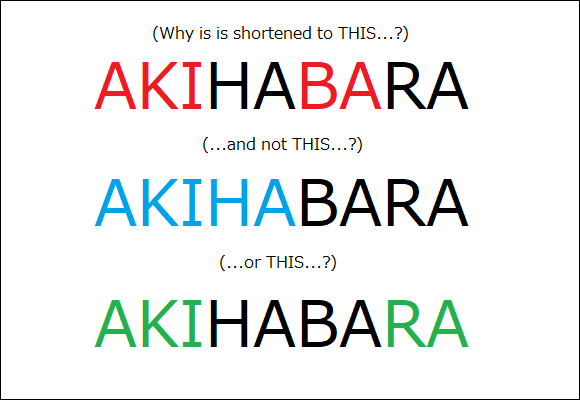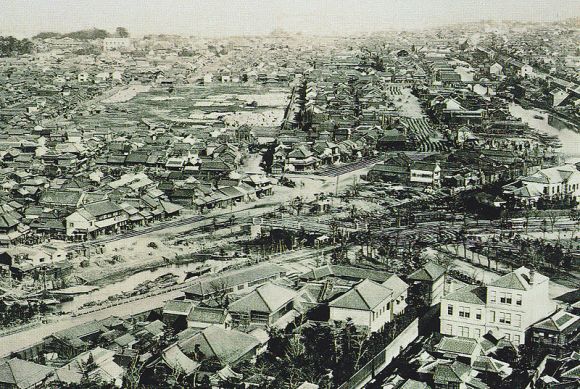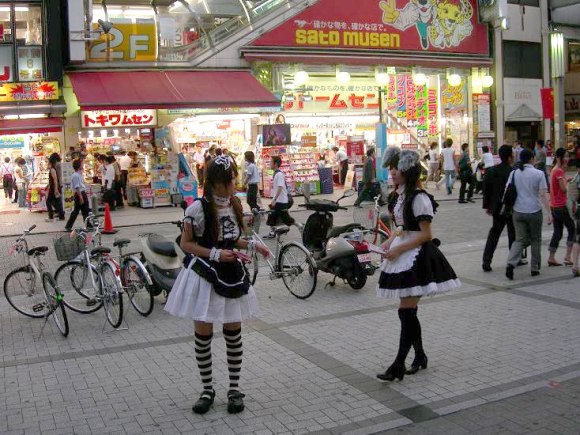We all know and love Tokyo’s Akihabara as the crazy neighborhood that boasts everything from maid cafes where you can lift weights with swole maids, to Internet cafes that look like beautiful Japanese ryokan, to virtual reality wedding experiences with the heart-throb anime husband of your dreams.
But Akihabara wasn’t always about otaku and technology. In fact, if you want to discover the origin of Akihabara’s shortened name (it’s often referred to as Akiba by residents and fans alike), then you have to go back more than a hundred years into Japanese history.
▼ It would make more sense it abbreviate it as Akiha, right? Although we can kind of see why they don’t abbreviate it as Akira.

Before the 20th century, Japan had a problem with fires, especially in the capital Edo (modern-day Tokyo). With all the buildings made of wood and packed tightly together, it didn’t take much for everything to go up in flames.
There were no less than 14 “great fires” from 1600 to 1855 in Edo that killed anywhere from thousands to hundreds of thousands of people. Fires were so common that a popular saying during the time was: “Fires and quarrels are the flowers of Edo.”
So finally in 1869 the Meiji government had enough. They set up an area in Edo called Chinkabara (Akihabara’s modern-day location) as a “fire proof area.” Its name Chinkabara even translates to “extinguished-fire field.”
▼ A photo of the Akihabara area from 1889. It doesn’t look a whole lot more fireproof than other Japanese cities at the time, but I guess it worked.

And, just to be extra safe, they had Akiba Daigongen (the Japanese Buddhist deity of fireproof-ness) transferred from Enshu (modern-day Shizuoka) to be enshrined in the new location.
Did you catch that deity’s name? It’s Akiba Daigongen, with Akiba meaning “autumn leaves,” another euphemism for fire. That’s where the name change starts.
Since the location’s name was Chinkabara, the shrine set up for the deity was originally called Chinka Jinja (Chinka Shrine). But the deity’s name was Akiba, so everyone just called it Akiba Jinja. Eventually the name of the temple changed from“Chinka to Akiba, so people started calling the area itself Akiba instead.
There were a bunch of different names for the location, some of them mixtures of Chinkabara and Akiba, such as Akibahara or Akibappara. It wasn’t until 1890 when the location got a railroad station and needed to be officially named that it was dubbed Akihabara, though it was still referred to as Akiba as well, a name that has stuck around until today.
▼ Akiba, once synonymous with fires, temples, and a deity, is now synonymous with maid cafes.

So there you have it! We can all thank the deity of fireproof-ness, Akiba Daigongen himself, for giving us Akihabara’s modern abbreviated name. Would he approve of Akihabra’s modern-day capsule hotels where you can sleep with anime characters? We have to imagine that, as long as the flames of passion don’t actually burn anything down, he’d think they’re a-okay!
Source: Akihabara Denki Machi Shinkokai via My Game News Flash
Read more stories from SoraNews24.
-- Tokyo specialized school’s new department will teach you to be an Akihabara professional
-- Despite having so many maids, officials say Akihabara really needs cleaning up
-- Akihabara then and now: Photos show how Tokyo neighborhood has changed over the past 10 years
- External Link
- https://soranews24.com/2018/05/26/why-is-akihabara-shortened-to-akiba-the-historical-reason-may-surprise-you/
 Take our user survey and make your voice heard.
Take our user survey and make your voice heard.















9 Comments
Login to comment
MrBum
The better question is why they went with Akihabara instead of Akibahara.
Jonathan Ng
Probably because of the kanji. 秋aki葉ha原bara. If they change it up, it'll be a different kanji, though technically the reading will still be the same, it kinda goes against the rules of reading. I dunno
Steven M. Jankowski
MrBum,
I would guess it's because the old name was Chinka[bara] and they wanted to reference that.
Alternatively, since the kanji are 秋 (aki)・葉 (ha)・原 (hara), they changed the はら to ばら for phonetic reasons.
Mizuame
Steven,
I tend to agree with MrBum. If you look at the kanji, 秋 (aki)・葉 (ba)・原 (hara) is more logical, and phonetically it's fine - think of the Battle of Sekigahara.
Hello Kitty 321
When I came to Japan people referred to it as 'Bahara'
MrBum
Mizuame,
That's exactly what I was thinking. But maybe Steven is right and they wanted to really emphasize the connection to Chinkabara, bara pronunciation of 原 and all. But then the question is why isn't it Akibabara, which is much more fun to say.
Aly Rustom
Akiba is one of the few places I actually like in the Metropolis. Its really relaxed and laid back.